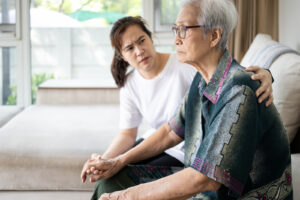Understanding Lewy Body Dementia & How In-Home Care Helps Seniors Thrive
Understanding Lewy Body Dementia among Seniors and its In-Home Care Implications
Lewy Body Dementia (LBD) is a complex neurodegenerative condition affecting millions of seniors worldwide, marked by abnormal protein deposits called Lewy bodies in their brains. LBD can severely affect cognitive abilities, behavior, and overall quality of life for seniors living with it. We will examine some symptoms associated with Lewy Body Dementia among seniors and discuss ways in-home care can provide valuable assistance and enhance their well-being.
Recognizing Lewy Body Dementia
Lewy Body Dementia symptoms can range widely and overlap with those seen with other dementias, making diagnosis challenging. Recognizing these signs early to provide appropriate care. Seniors living with LBD often experience fluctuating cognition, with significant variations in attention, alertness, and thinking ability throughout the day. Visual hallucinations are also common symptoms. Often vivid and detailed visual hallucinations can also occur. Seniors with LBD often show Parkinsonian-like symptoms such as rigidity, slow movements, and tremors. Disruptive sleep behaviors associated with LBD, such as vivid dreams or acting out during sleep, have also been observed frequently as cognitive fluctuations (increasing attention or concentration suddenly changing) occur regularly.

Lewy Body Dementia Affecting Quality of Life
LBD can have a devastating impact on a senior’s overall quality of life. The symptoms and challenges associated with LBD can result in increased dependency, diminished independence, and social isolation for seniors with this disease. Seniors diagnosed with Lewy Body Dementia often find it challenging to participate in their usual activities or maintain relationships due to cognitive decline, hallucinations, or motor symptoms; such a deterioration highlights the significance of receiving adequate care and support services.
Home Care Can Provide Relief
In-home care services are essential in supporting seniors living with Lewy Body Dementia and improving their quality of life. Personalized assistance from caregivers is central to in-home care; their tailored assistance meets individual needs by aiding with activities of daily living, medication administration, and providing a safe and comfortable environment for seniors with LBD. Furthermore, caregivers explicitly trained in dementia care may engage their clients in cognitively stimulating activities to promote mental well-being while slowing cognitive decline.
Companionship and socialization are of utmost importance for seniors living with LBD, who often feel lonely and isolated. Caregivers can offer friendship and support while engaging in meaningful discussions or activities to reduce feelings of social isolation. Safety and mobility issues for LBD seniors present increased risks due to motor symptoms; caregivers can assist with mobility and supervision and create a safe living environment.
In-home care also provides respite for family caregivers looking after loved ones living with LBD. By offering support and assistance, in-home caregivers allow these family caregivers to take breaks, recharge, and avoid burnout.
Lewy Body Dementia presents many challenges for seniors and their families. Understanding its symptoms is paramount for early diagnosis and appropriate care. At the same time, in-home caregivers provide invaluable assistance, cognitive stimulation, companionship, safety assurance, and enhanced well-being of seniors with Lewy Body Dementia. Contact a professional caregiver to improve the quality of your older loved one with LBD.
If you or an aging loved-one is considering In-Home Care in Herndon, VA please contact the caring staff at Butters Home Health Care today. (703) 371-2113
URLs:
https://www.nia.nih.gov/health/caring-person-lewy-body-dementia
https://www.alz.org/alzheimers-dementia/what-is-dementia/types-of-dementia/dementia-with-lewy-bodies
